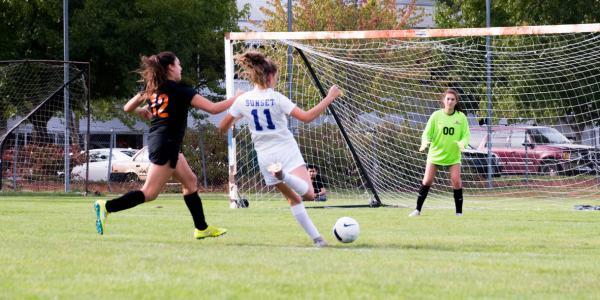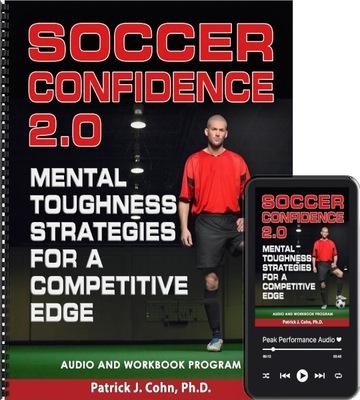
Are You in Peak Physical Condition?
Soccer players, coaches, and trainers understand the importance of staying in shape and pay particular attention to physical conditioning during training and practice sessions.
If you are not at peak physical condition, you give an advantage to your opponents. You will lack the speed to challenge for balls, become tired later in games, be slow and sluggish on the field, and have difficulty pushing the ball downfield.
Though physical conditioning is important, it is just one component of peak performance.
The other part of the performance equation has to do with the mind. That is, “Are you in peak mental condition?” Most players would answer “No,” even though they recognize the contribution of mental factors to success.
When you are in peak mental condition, you gain a significant edge over your opponents.
What is Peak Mental Conditioning?
Peak mental conditioning is having well-develop mental skills such as high confidence, laser focus, emotional control, and resilience.
With comprehensive mental skills, you can push your limits in training, overcome mistakes during games, deal effectively with competitive pressure, process information quickly, and uncover your athletic potential.
Peak mental conditioning is more than possessing mental skills but being able to apply those skills across a broad range of competitive circumstances.
Ultimately, peak mental condition affects everything you do during practice, in games, while injured, and off the field.
Ignoring your mental conditioning is no different than disregarding your physical conditioning. Peak performance demands that you condition your mind as you condition your body.
USWNT midfielder Rose Lavelle is a significant contributor to the women’s team. Lavelle injured her knee during a 2023 friendly against Ireland and is rehabbing in hopes of playing for the U.S. World Cup squad.
LAVELLE: “Anybody who has been through a long-term injury knows, for how hard it is physically, it’s ten times harder mentally. I wanted to make sure that I was doing everything to make sure that my mind was in the same place that my body was…It’s such an important part of being a professional athlete.”
Lavelle recognized the importance of mental training even before her injury.
Lavelle began seeing a sports psychologist when she turned pro to improve her mental conditioning and achieve peak performance consistently. However, you don’t have to be a pro athlete to work on your mental game.
Mental training provides powerful mental startegies to help you achieve athletic excellence, reach your goals, and lead to ultimate peak performance.
Mental conditioning requires training just as physical conditioning. The first step is to assess your mental skills and what mindsets hinder you from performing your best in games.
For example, we use the Soccer Mental Aptitude Profile (SMAP) to help us assess your mental game performance.
This helps us narrow down the mental skills that you or your athletes need to improve the mental game.
For example, managing pressure-packed expectations, refocusing when distracted, proactive confidence, and trust in your skills are critical to your success.
Related Sports Psychology Articles
- Are you Conditioning Your Mind to Perform Well?
- How Elite Soccer Players Raise the Bar and Achieve Excellence
- How Soccer Players Have Breakout Games
- Subscribe to The Sports Psychology Podcast on iTunes
- Subscribe to The Sports Psychology Podcast on Spotify
Download a free sports psychology report to improve your mental game!
Learn more about our one-on-one mental game coaching.
Boost Confidence in Soccer

“Soccer Confidence 2.0” 3-CD and Workbook program is the most comprehensive mental game program we’ve offered to the public. We’re virtually giving away all our mental game secrets for the incredibly low price of only $197.00 including the free bonuses!
“Soccer Confidence” is a complete brain dump of the TOP NINE mental training sessions we teach our soccer players to help them boost their mental game and improve consistency – from how to mentally prepare for games to performing under pressure to building unstoppable confidence.
